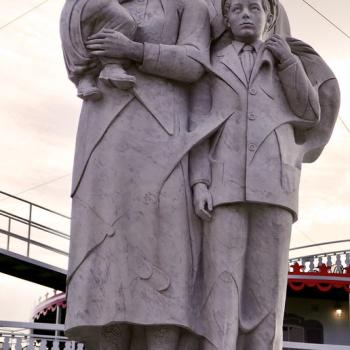By Phil A. Webb, Jr.
 In "Why Marriage between Homosexuals is Good for Marriage," Rosemary Radford Ruether makes a compelling case for same-sex marriage. This case is built from a premise that marriage extends good and promotes stability to any two same-sex or heterosexual adults who are in a life-long loving, committed, and monogamous relationship.
In "Why Marriage between Homosexuals is Good for Marriage," Rosemary Radford Ruether makes a compelling case for same-sex marriage. This case is built from a premise that marriage extends good and promotes stability to any two same-sex or heterosexual adults who are in a life-long loving, committed, and monogamous relationship.
This being the definitive expression of marriage, the Church and much of society appear to be determining unfairly who can express this kind of love and commitment in marriage and who cannot. For Ms. Ruether, this makes no logical or empirical sense, and she is right! From this premise it makes no sense to me either.
For the Catholic Church and much of society, however, this understanding of marriage does not get at the heart of its unique expression. The definitive expression of married love is more than the mutual attraction, quality of love, and commitment of two adults. Rather, the essence of marriage is summed up in the conjugal bond or sexual embrace. This and only this makes marriage what it is, and consummates the ordering of male and female in a particular kind of society with a unique vocation.
Marital love does not contain more dignity than other expressions of love. It does not render other forms of self-giving second class. It does represent a public bond suitable for its obligations to family and society should, God willing, such responsibilities come to pass. An ability to engage in the sexual act, openness to children, and ordering to the family, even if through adoption, and even if the couple is beyond childbearing age, is the beauty and fruit of marriage, and its unique responsibility.
The Catholic Church believes Christ elevated marriage to the dignity of a sacrament, and it is here that God desires most to participate in the creation of new life, sacred, and made in God's image. Marriage, however, is a human ordering that does not originate with the state or the church. It exists naturally as the basic cell of society that protects and replenishes it with the next generation. Marriage attaches children to both a mother and father according to the child's dignity. The societal stability this promotes is precisely why politicians and courts are obligated, not to redefine marriage or treat it as merely a religious question, but to protect and encourage it.
Same-sex couples can certainly be good people, and no doubt are often better people than many heterosexual couples, but they can't be both a mother and a father. Dr. Richard Fitzgibbons, M.D., a psychiatrist with the Catholic Medical Association, stated "social science research supports the recent statement of the Vatican that to deliberately deprive a child of a father or a mother through adoption by those in the homosexual lifestyle would inflict severe harm onto those children." Research on the needs of children for both a father and a mother have been reviewed in many places, including recent papers from the University of South Carolina School of Medicine and the University of Utah School of Medicine. We simply cannot deny the significance of the male-female nature of humanity and the created orderliness that sexual diversity brings to parenting.
In our culture, we are falling short of this ideal in many ways. Four out of ten children are now born in this country without both a father and mother. Nevertheless, it is an ideal given by God according to the dignity of children, and should be promoted with relentless vigor.
Heaven forbid any of us predict the end of western civilization because of same-sex marriage. It will, however, introduce unfortunate side effects, as we are seeing now in some places. Legalizing same-sex marriage will make it necessary for government to defend and enforce other changes in society. For instance, when the state says that same-sex couples are equivalent to opposite-sex couples, adoption laws and school curriculum will have to support this claim.
In several states, anti-discrimination statutes are trumping those who seek religious exemptions under the free-exercise clause of the First Amendment. In some places, individuals are considered unable to win elections or hold public office because they adhere to traditional teaching about sex and marriage and their moral and religious objections to Gay, Lesbian, Bisexual, and Transsexual behavior are made public.
Finally, those of us who think deeply about this on both sides of the issue understand at some level that to view marriage as an equal right for any two adults who love and commit to each other is also to admit other possibilities for marriage. It is logically unavoidable. Despite the charge of fear mongering, in fact, redefining marriage in this way creates credible reason to allow marriage for other kinds of loving committed arrangements.




